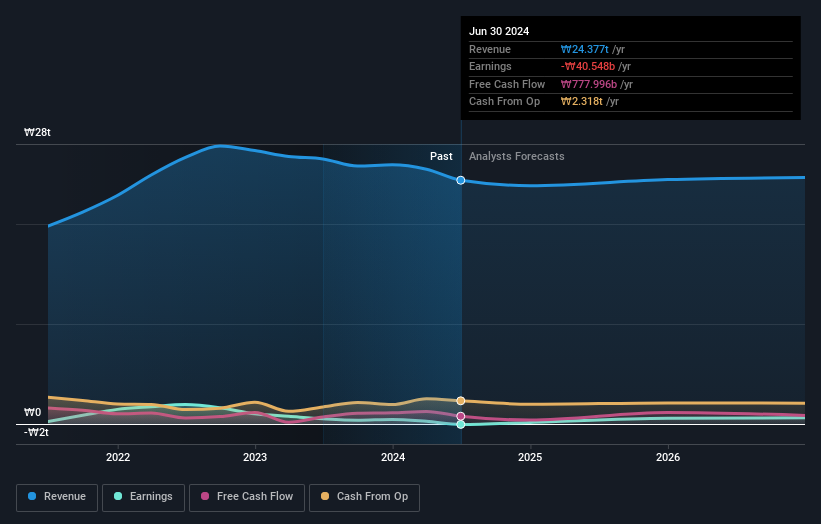Hyundai Steel Company's (KRX:004020) stock price dropped 3.3% last week; individual investors would not be happy
Key Insights
- Hyundai Steel's significant individual investors ownership suggests that the key decisions are influenced by shareholders from the larger public
- A total of 8 investors have a majority stake in the company with 51% ownership
- 12% of Hyundai Steel is held by insiders
To get a sense of who is truly in control of Hyundai Steel Company (KRX:004020), it is important to understand the ownership structure of the business. And the group that holds the biggest piece of the pie are individual investors with 43% ownership. That is, the group stands to benefit the most if the stock rises (or lose the most if there is a downturn).
And following last week's 3.3% decline in share price, individual investors suffered the most losses.
Let's delve deeper into each type of owner of Hyundai Steel, beginning with the chart below.
See our latest analysis for Hyundai Steel

What Does The Institutional Ownership Tell Us About Hyundai Steel?
Many institutions measure their performance against an index that approximates the local market. So they usually pay more attention to companies that are included in major indices.
Hyundai Steel already has institutions on the share registry. Indeed, they own a respectable stake in the company. This suggests some credibility amongst professional investors. But we can't rely on that fact alone since institutions make bad investments sometimes, just like everyone does. It is not uncommon to see a big share price drop if two large institutional investors try to sell out of a stock at the same time. So it is worth checking the past earnings trajectory of Hyundai Steel, (below). Of course, keep in mind that there are other factors to consider, too.

Hedge funds don't have many shares in Hyundai Steel. Our data shows that Kia Corporation is the largest shareholder with 18% of shares outstanding. With 12% and 7.2% of the shares outstanding respectively, Mong-Koo Chung and National Pension Service are the second and third largest shareholders.
We also observed that the top 8 shareholders account for more than half of the share register, with a few smaller shareholders to balance the interests of the larger ones to a certain extent.
While it makes sense to study institutional ownership data for a company, it also makes sense to study analyst sentiments to know which way the wind is blowing. There are a reasonable number of analysts covering the stock, so it might be useful to find out their aggregate view on the future.
Insider Ownership Of Hyundai Steel
While the precise definition of an insider can be subjective, almost everyone considers board members to be insiders. Management ultimately answers to the board. However, it is not uncommon for managers to be executive board members, especially if they are a founder or the CEO.
Insider ownership is positive when it signals leadership are thinking like the true owners of the company. However, high insider ownership can also give immense power to a small group within the company. This can be negative in some circumstances.
It seems insiders own a significant proportion of Hyundai Steel Company. Insiders own ₩434b worth of shares in the ₩3.6t company. That's quite meaningful. It is good to see this level of investment. You can check here to see if those insiders have been buying recently.
General Public Ownership
The general public-- including retail investors -- own 43% stake in the company, and hence can't easily be ignored. While this group can't necessarily call the shots, it can certainly have a real influence on how the company is run.
Public Company Ownership
We can see that public companies hold 24% of the Hyundai Steel shares on issue. We can't be certain but it is quite possible this is a strategic stake. The businesses may be similar, or work together.
Next Steps:
While it is well worth considering the different groups that own a company, there are other factors that are even more important. Take risks for example - Hyundai Steel has 2 warning signs (and 1 which is potentially serious) we think you should know about.
If you would prefer discover what analysts are predicting in terms of future growth, do not miss this free report on analyst forecasts.
NB: Figures in this article are calculated using data from the last twelve months, which refer to the 12-month period ending on the last date of the month the financial statement is dated. This may not be consistent with full year annual report figures.
Have feedback on this article? Concerned about the content? Get in touch with us directly. Alternatively, email editorial-team (at) simplywallst.com.
This article by Simply Wall St is general in nature. We provide commentary based on historical data and analyst forecasts only using an unbiased methodology and our articles are not intended to be financial advice. It does not constitute a recommendation to buy or sell any stock, and does not take account of your objectives, or your financial situation. We aim to bring you long-term focused analysis driven by fundamental data. Note that our analysis may not factor in the latest price-sensitive company announcements or qualitative material. Simply Wall St has no position in any stocks mentioned.
 Index Options
Index Options CME Group
CME Group Nasdaq
Nasdaq Cboe
Cboe TradingView
TradingView Wall Street Journal
Wall Street Journal